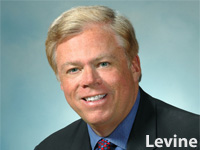
SYRACUSE -- Consolidation is always a controversial topic among broadcasters. Galaxy CEO and President Ed Levine garnered plenty of praise this week when he criticized the overuse of the cost-cutting strategy, in an interview with Radio Ink, a national radio trade magazine. In the article, he said consolidation is sending radio "backwards," as many owners overlook the potential rewards of localizing their stations.
While national radio trade publications often seem to be focused primarily on major market happenings, the January 21 issue of Radio Ink will put the spotlight on small market radio. Levine's interview, offering his perspective from owning stations in Syracuse and Utica for more than 20 years, will be the cover story of the issue.
In a preview released on Radio Ink's website on Wednesday, Levine said, "consolidation has caused radio revenue to grow backwards." He suggests that corporate owners have gone too far with syndication, voicetracking and other cost-cutting measures. Looking back over the past 15 years, he said, "first it was cutting the fat, then you cut the muscle, then the bone. Now they are splitting tissues apart."
Levine warned that "the more we continue to eliminate staff," and replace those local personalities with syndicated fare, "the more vulnerable we [as an industry] are going to be." He suggests that great radio is built on "serving the community. It’s an old fashioned concept but it works." While he says that doesn't necessarily mean every radio station needs to be live and local around the clock, he says radio owners can "reap the rewards" of investing in "local personalities, local promotions and local events."
Today, Radio Ink posted a follow-up. Between comments posted on the magazine's website, and messages sent directly to Levine -- whose personal email address was included in the article -- readers agreed with Levine's criticism of radio as a whole. While one reader suggested Levine only "stated the obvious," another reader credited Levine for being "one of the only [top radio executives] with the brass to state it in a national magazine."
Radio Ink also provided some of Levine's insight on the way many major radio operators are treating their employees. " The lack of respect for employees in the radio industry in the last ten years is horrendous. I think that is one of the things that needs to change, too." Relating that point to his recent hire of former 95X (WAQX) morning hosts Hunter Scott and Josh Grosvent for K-Rock (WKRL/WKRH/WKLL), Levine explained:
"The guys I just hired from Cumulus (on-air) came into the Syracuse market two years ago. Nobody knew them. Within a couple of years they became a top team in the market. Cumulus simply let their contract expire. These guys wanted to stay there. They asked multiple times, 'What's our status?' They received no answer. That's basic disrespect. That doesn't help anybody."
One reader expressed agreement by pointing out his belief that consolidation has taken "passion" away from radio's product. Another pointed out that consolidation among radio's larger corporate owners has a potential to provide positive side effects for small market operators. Starting out with one station, K-Rock (WKLL) in Utica, Galaxy has grown to a total of 14 stations in the Syracuse and Utica-Rome radio markets.
That's pretty funny coming from the guy who bought an entire station so he could fire the same guy twice.